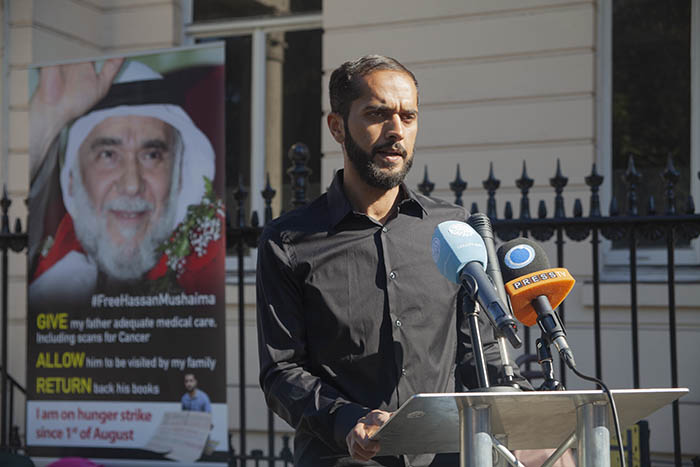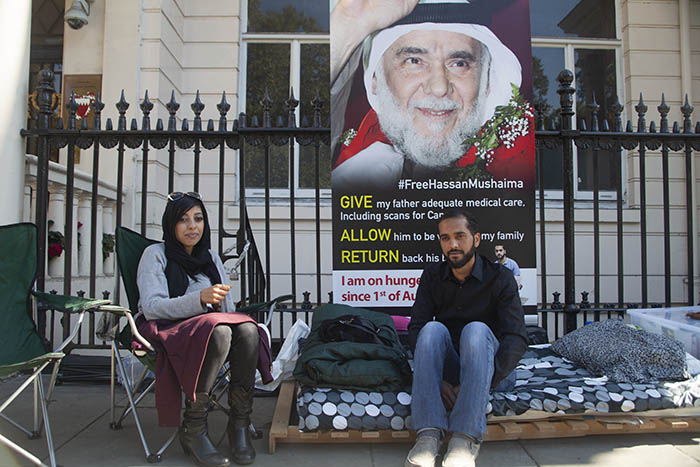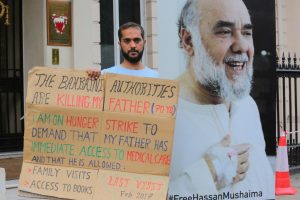Index relies entirely on the support of donors and readers to do its work.
Help us keep amplifying censored voices today.
[vc_row][vc_column][vc_single_image image=”80241″ img_size=”full” add_caption=”yes”][vc_column_text]We the undersigned call on Bahraini authorities to release Nabeel Rajab immediately, to repeal his convictions and sentences, and drop all charges against him. On 31 December 2018 the Court of Cassation in Bahrain may issue its verdict in the appeal of the five-year prison sentence handed to him for peaceful comments posted and retweeted on his Twitter account about the killing of civilians in the Yemen conflict by the Saudi Arabia-led coalition, and allegations of torture in Jau prison.
We are concerned that the authorities intend to increase Rajab’s prison sentence unopposed, by setting 31 December as the date for a hearing and possible issuing of a verdict, while most Bahrainis and people around the globe will be focused on year-end celebrations. This is not an idle concern, as, opposition leader Sheikh Ali Salman was arrested on 28 December 2014 and subsequently convicted and sentenced to four years in jail following an unfair trial. And last month, in yet another case brought against him on spying charges, the Court of Appeal overturned his initial acquittal and sentenced him instead to life in prison.
Rajab has been a tireless champion of human rights for many years, helping to found and run the Bahrain Center for Human Rights and the Gulf Centre for Human Rights, both members of the IFEX network.
He has been detained since his arrest on 13 June 2016. He was held largely in solitary confinement during the first nine months of his detention, violating UN rules on pre-trial imprisonment, and has been subjected to humiliating treatment. His books, toiletries, and clothes have been confiscated and his cell frequently raided at night.
Rajab was sentenced to two years in jail in 2017 on charges of “publishing and broadcasting false news that undermines the prestige of the state” during TV interviews he gave in 2015 and 2016 in which he stated that Bahraini authorities bar reporters and human rights workers from entering the country. He was sentenced in 2018 to five years in prison on charges of “disseminating false rumors in times of war” for tweets about torture in Jau Prison and the war in Yemen.
At its eighty-first session, 17-26 April 2018, the Working Group on Arbitrary Detention concluded that Rajab’s “deprivation of liberty constitutes a violation of articles 2 and 7 of the Universal Declaration of Human Rights and articles 2 (1) and 26 of the Covenant – on the grounds of discrimination based on political or other opinion, as well as on his status as a human rights defender”.
We therefore urge Bahraini authorities to immediately and unconditionally release Nabeel Rajab, quash his convictions and sentences, and drop all charges against him; and undertake a prompt, impartial, independent and effective investigation into his allegations of ill-treatment. The findings of the investigation must be made public and anyone suspected of criminal responsibility must be brought to justice in fair proceedings.
As this case is part of a pattern of abuse and harassment against human rights defenders and journalists in Bahrain, we also urge the authorities to cease all such actions and ensure that the right to freedom of expression and freedom of the press is respected.
Signed,
Bahrain Center for Human Rights
ActiveWatch – Media Monitoring Agency
Adil Soz – International Foundation for Protection of Freedom of Speech
Africa Freedom of Information Centre (AFIC)
Americans for Democracy & Human Rights in Bahrain (ADHRB)
Arabic Network for Human Rights Information (ANHRI)
Association for Freedom of Thought and Expression (AFTE)
Association of Caribbean Media Workers
Bytes for All (B4A)
Cairo Institute for Human Rights Studies (CIHRS)
Cambodian Center for Human Rights (CCHR)
Electronic Frontier Foundation (EFF)
Foro de Periodismo Argentino
Freedom Forum
Free Media Movement
Globe International Center
Gulf Centre for Human Rights (GCHR)
Human Rights Watch (HRW)
I’lam Arab Center for Media Freedom Development and Research
Independent Journalism Center (IJC)
Index on Censorship
Initiative for Freedom of Expression – Turkey
International Press Centre (IPC)
Maharat Foundation
Mediacentar Sarajevo
Media, Entertainment and Arts Alliance
Media Institute of Southern Africa (MISA)
Media Rights Agenda (MRA)
Media Watch
Norwegian PEN
OpenMedia
Pacific Freedom Forum (PFF)
Pacific Islands News Association (PINA)
Palestinian Center for Development and Media Freedoms (MADA)
PEN America
Reporters Without Borders (RSF)
Social Media Exchange (SMEX)
Southeast Asian Press Alliance (SEAPA)
South East European Network for Professionalization of Media (SEENPM)
South East Europe Media Organisation
Syrian Center for Media and Freedom of Expression (SCM)
World Association of Community Radio Broadcasters (AMARC)
World Association of Newspapers and News Publishers
Amnesty International
Bahrain Institute for Human Rights
Bahrain Interfaith
Campaign Against Arms Trade
CIVICUS
FIDH under the Observatory for the Protection of Human Rights Defenders
Frontline Defenders
Gulf Institute for Human Rights
ISHR
Martin Annals
MENA Monitoring Group
OMCT under the Observatory for the Protection of Human Rights Defenders
RAFTO
Salam for Democracy and Human Rights[/vc_column_text][vc_basic_grid post_type=”post” max_items=”4″ element_width=”6″ grid_id=”vc_gid:1545127071633-da20ca65-6e8f-0″ taxonomies=”3368, 716″][/vc_column][/vc_row]
[vc_row][vc_column][vc_column_text]

Ali Mushaima gives press conference in front of the Bahrain Embassy in London. (Credit: Gillian Trudeau)
At a press conference outside the Bahraini Embassy in London on 13 September, Bahraini human right activist Ali Mushaima vowed to continue fighting for his 70-year-old father Hassan Mushaima, who was imprisoned in 2011 as part of a crackdown on political activists in the country.
Mushaima said: “After 44 days many friends have argued for me to end my hunger strike. I even received a message from Nabeel Rajab in prison. But what affected me the most was my father telling me how scared he was that there I was hospitalised. I will not end my hunger strike but I will start a liquid diet that will include soups. My body needs to recover but if my father’s basic rights are not met, which is full medical care, family visits and access to books, I’m ready to resume my full hunger strike not because it’s easy and not because it is life-threatening, but because I will never stop fighting for my dad and for our cause.”
Human rights activist Zainab Al Khawaja, who has joined Mushaima’s demonstration after travelling from Denmark, was thanked for her solidarity. Khawaja’s activism has seen her arrested twice in Bahrain, once while pregnant and once with her infant son. Like Hassan Mushaima, Al Khawaja’s father, Abdulhadi Al Khawaja, faces possible life imprisonment.
Outside the Bahraini Embassy, Mushaima also expressed his gratitude towards MPs such as Caroline Lucas and Ian Blackford for raising his father’s case and shedding light on the suffering of political prisoners in Bahrain. His strike has garnered global recognition, going as far as being mentioned by the Human Rights Council in Geneva.
The British Government’s decision to support “false” statements made by the Bahraini Government was highlighted by Mushaima. He believes the UK has been part of the problem rather than the solution, alleging Britain has spent millions of pounds of taxpayers’ money to train Bahrain police violence and to teach them how to whitewash their crimes. Last month Mushaima asked for the Queen’s assistance, citing her friendship with the king of Bahrain as one of the many ways she could help influence the case.
Andrew Smith, who works for Campaign Against Arms Trade, was on hand to show his support. He said: “We want to express our support for Ali’s demands and solidarity with the stands that he has taken. This hunger strike should never have had to happen. The Bahraini regime should never be treating prisoners the way that they have treated Ali’s father. The UK Government should not be arming and supporting such a brutal, oppressive regime which has carried out atrocities against its people for years and has treated Ali’s father, and many other prisoners, absolutely appallingly.”
Background:
In response to Mushaima’s hunger strike, Hassan Mushaima received a cancer scan and has been given access to vital medication that was previously unavailable to him, but several issues remain:
In January 2018, Hassan Mushaima was told by a doctor at the Bahrain Defence Force Hospital that he urgently needs to see a diabetes specialist. He has not been granted access to a consultation yet by the authorities.
In October 2017, Hassan Mushaima’s books, personal notes, and writing materials were confiscated for no reason. They may have been destroyed.
Hassan Mushaima continues to be denied his right to family visitation without being subjected to humiliating measures, including being shackled. He last saw his family 18 months ago, in February 2017.

Bahraini human rights activists Zainab al-Khawaja and Ali Mushaima outside of the Bahrain Embassy in London. (Credit: Gillian Trudeau)
[/vc_column_text][/vc_column][/vc_row][vc_row][vc_column][vc_basic_grid post_type=”post” max_items=”4″ element_width=”6″ grid_id=”vc_gid:1537179808073-af3ba6e6-3e04-5″ taxonomies=”716″][/vc_column][/vc_row]
Margaret Atwood, Elif Shafak and Ali Smith are just two among a group of leading writers piling pressure on the Bahraini king to intervene in the case of a detained political leader who was stripped of the right to read in jail. Read the full article
[vc_row][vc_column][vc_column_text]

The Bahraini human rights mechanisms have largely failed to properly address concerns raised on behalf of Hassan Mushaima, and his life remains at risk. Because of this, his son, Ali Mushaima, is on a hunger strike outside of Bahrain’s Embassy in London.
Bahraini campaigner Ali Mushaima is returning to his protest site outside the Bahrain embassy in Knightsbridge, London, 24 hours after being hospitalised. Mushaima is on day 31 of a hunger strike in opposition to the treatment of his 70-year-old father Hassan Mushaima, who was locked-up in 2011 as part of the crackdown in Bahrain.
On Thursday Mushaima left the site in an ambulance and was taken to St Thomas’s Hospital in Westminster to receive treatment at around 14:30. He spent the night with his family. Since the beginning of his protest on 1 August, Mushaima has lost 13 Kg having only taken juices and milk. Mushaima’s doctor, who paid him a visit outside the Embassy on 29 August night, said his health conditions were critical, and that his body temperature and sugar level where extremely low. Over the 24 hours before being hospitalised, Mushaima developed chest and abdominal pain. According to his medical report, when the ambulance arrived, his blood sugar had dropped to 3.1. While in hospital, Mushaima did not consume any solid foods.
Mushaima is demanding basic rights for his father, including medical assistance, family visitation rights and access to his books. These have all been denied to him by the regime, which continue to violate Hassan Mushaima’s rights under UN minimum detention standards (known as Mandela Rules).
On 28 August, Mushaima received a call from his father who informed him that he was taken to the hospital for cancer screening. This came after two years in which the Bahraini authorities have denied him access to an oncologist. It appears that all of Hassan’s books, personal notes, writing material and even the Quran have been destroyed after being confiscated without “any legal or logical justification” in October 2017. The authorities appear to have taken this action even though the materials were previously approved by the prison administration. This information was provided to a fellow inmate by a prison officer while Hassan was at the hospital.
Mushaima has received cross-party support for his demands. Support came also from SNP Ian Blackford, who called on the Secretary of State to step in and demand Hassan Mushaima’s release. The co-leaders of the Green Party, Caroline Lucas MP and Jonathan Bartley, have additionally written to MENA Minister Alistair Burt to demand intervention.
BIRD has written to the Foreign Office to express concerns that it is relying on assurances by the Bahraini government and the UK-trained National Institute for Human Rights (NIHR) in Bahrain. Through its technical assistance programme, since 2012 the UK government has been funding various institutions in Bahrain that are complicit in the denial of adequate medical treatment, including the NIHR.
Ali Mushaima said: “I am returning to the embassy today to continue my protest. My demands are so basic and could all be granted tomorrow. The way the regime has treated my father is appalling. My body is weak, but this protest is my last resource, and if this is what it takes for them to treat my father humanely, then I will not stop until he is given the treatment he needs, family visits and access to his books. These are non-negotiable rights that should be afforded to all prisoners.”
BIRD Director of Advocacy, Sayed Ahmed Alwadaei said: “The UK has now become part of the problem, rather than a solution. It’s been a month since Ali started his hunger strike, only to find out that the UK will not call for an end to the cruelty Bahrain is subjecting him and his family to. Instead, the UK has decided to back the lies of a government that is deliberately denying a 70-year-old man his most basic human rights.”
Background:
In response to Mushaima’s hunger strike, Hassan Mushaima received a cancer scan and has been given access to vital medication that was previously unavailable to him, but several issues remain:
In January 2018, Hassan Mushaima was told by a doctor at the Bahrain Defence Force Hospital that he urgently needs to see a diabetes specialist. He has not been granted access to a consultation yet by the authorities.
In October 2017, Hassan Mushaima’s books, personal notes, and writing materials were confiscated for no reason. They may have been destroyed.
Hassan Mushaima continues to be denied his right to family visitation without being subjected to humiliating measures, including being shackled. He last saw his family 18 months ago, in February 2017.
[/vc_column_text][vc_basic_grid post_type=”post” max_items=”4″ element_width=”6″ grid_id=”vc_gid:1535711781445-93a88da7-5e22-9″ taxonomies=”716″][/vc_column][/vc_row]